Natural Support in Intellectual Disability: RNID's Role and Advocacy
VerifiedAdded on 2022/09/12
|7
|1743
|27
Essay
AI Summary
This essay explores the concept of natural support for individuals with intellectual disabilities, contrasting it with service-led care models. It defines intellectual disability and categorizes different types of natural support, including micro-boards, peer-based approaches, educational training, and befriending strategies. The paper highlights the role of Registered Nurses in Intellectual Disability (RNID) in Ireland, emphasizing their focus on providing health and social care services to individuals with intellectual disabilities and their families. It argues that RNIDs are better positioned to encourage natural support compared to traditional service care structures, as they actively promote community inclusion, family involvement, and the development of independent living skills. The essay also touches on the importance of advocacy, independence in relationships, and potential obstacles that may arise in supporting individuals with intellectual disabilities.
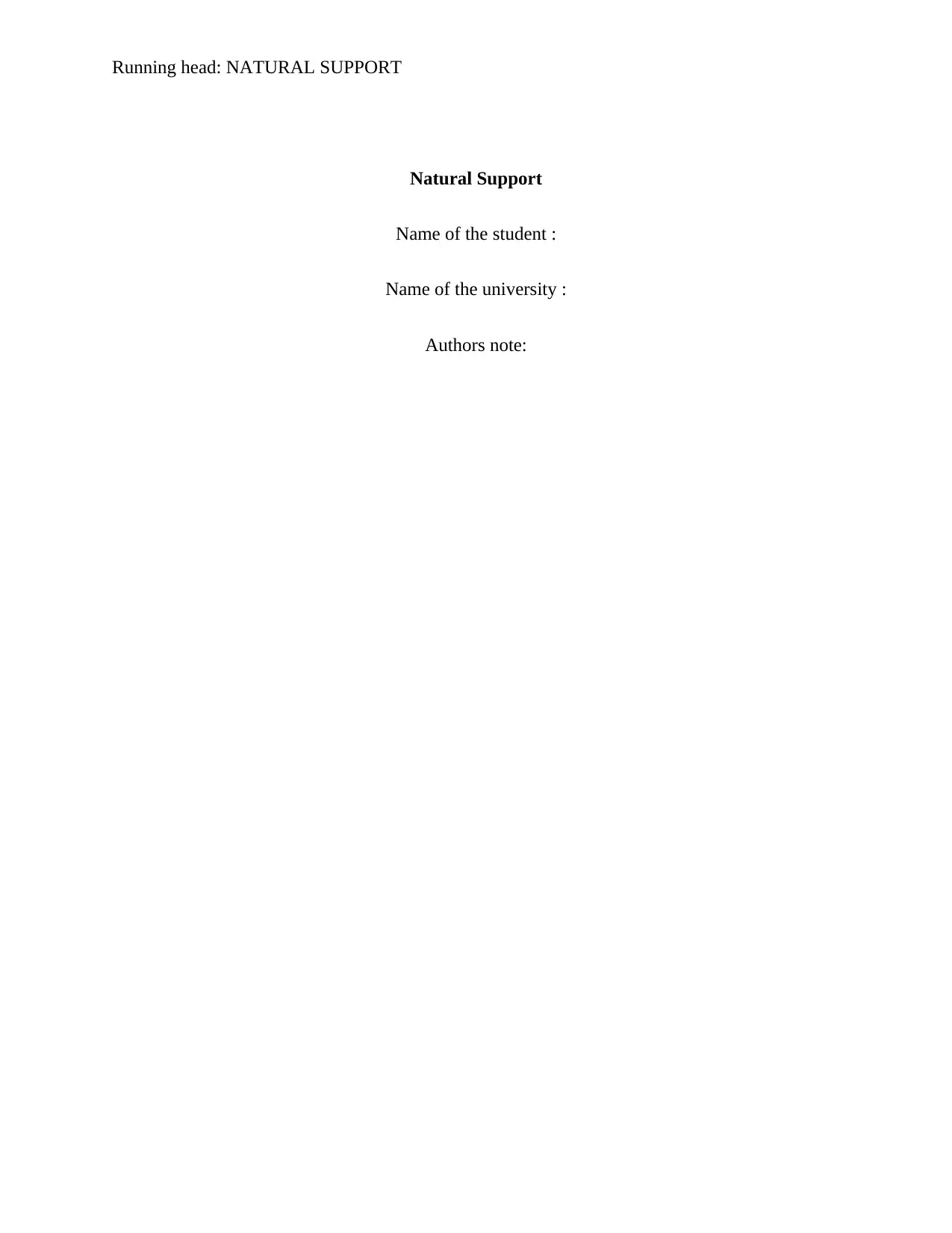
Running head: NATURAL SUPPORT
Natural Support
Name of the student :
Name of the university :
Authors note:
Natural Support
Name of the student :
Name of the university :
Authors note:
Paraphrase This Document
Need a fresh take? Get an instant paraphrase of this document with our AI Paraphraser
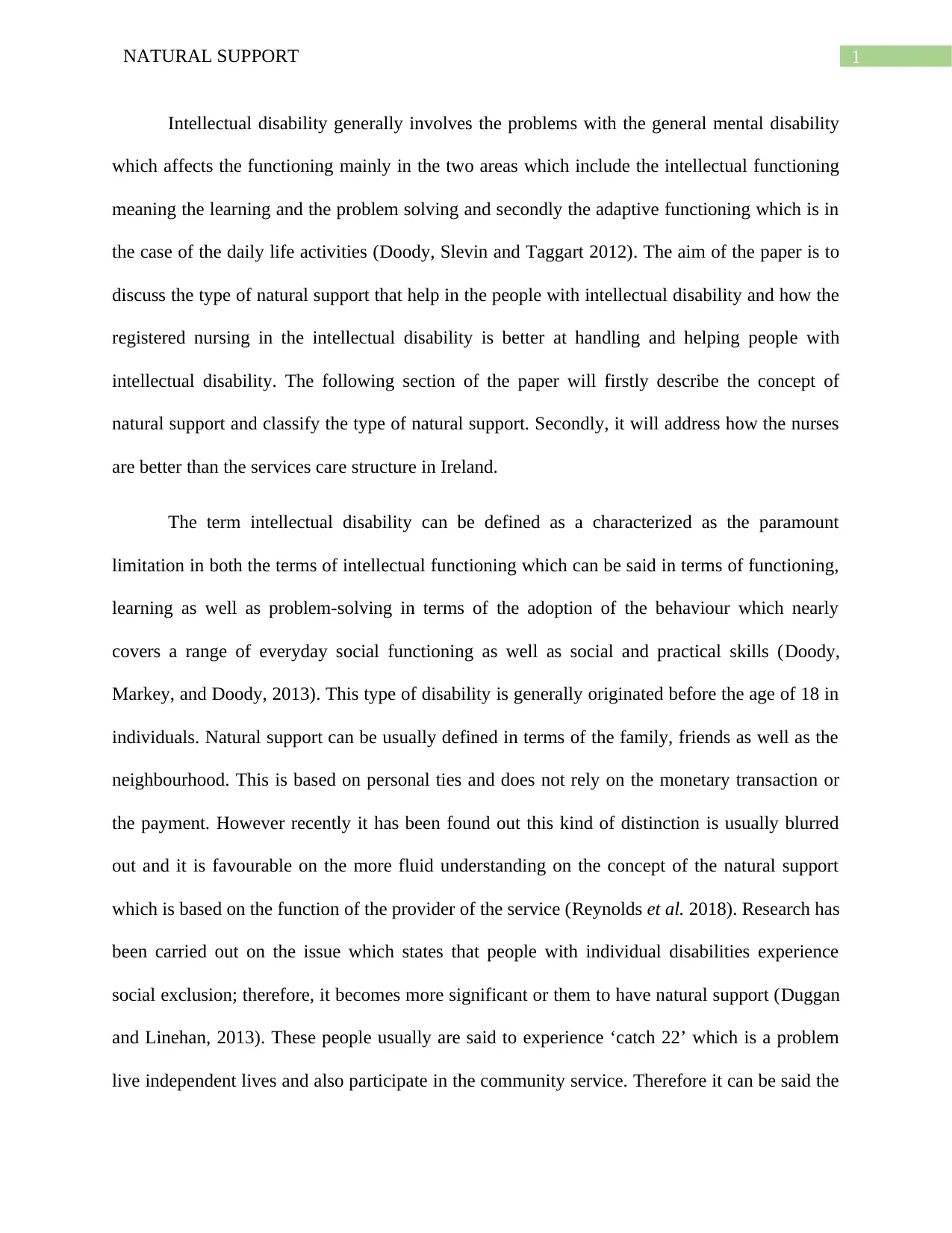
1NATURAL SUPPORT
Intellectual disability generally involves the problems with the general mental disability
which affects the functioning mainly in the two areas which include the intellectual functioning
meaning the learning and the problem solving and secondly the adaptive functioning which is in
the case of the daily life activities (Doody, Slevin and Taggart 2012). The aim of the paper is to
discuss the type of natural support that help in the people with intellectual disability and how the
registered nursing in the intellectual disability is better at handling and helping people with
intellectual disability. The following section of the paper will firstly describe the concept of
natural support and classify the type of natural support. Secondly, it will address how the nurses
are better than the services care structure in Ireland.
The term intellectual disability can be defined as a characterized as the paramount
limitation in both the terms of intellectual functioning which can be said in terms of functioning,
learning as well as problem-solving in terms of the adoption of the behaviour which nearly
covers a range of everyday social functioning as well as social and practical skills (Doody,
Markey, and Doody, 2013). This type of disability is generally originated before the age of 18 in
individuals. Natural support can be usually defined in terms of the family, friends as well as the
neighbourhood. This is based on personal ties and does not rely on the monetary transaction or
the payment. However recently it has been found out this kind of distinction is usually blurred
out and it is favourable on the more fluid understanding on the concept of the natural support
which is based on the function of the provider of the service (Reynolds et al. 2018). Research has
been carried out on the issue which states that people with individual disabilities experience
social exclusion; therefore, it becomes more significant or them to have natural support (Duggan
and Linehan, 2013). These people usually are said to experience ‘catch 22’ which is a problem
live independent lives and also participate in the community service. Therefore it can be said the
Intellectual disability generally involves the problems with the general mental disability
which affects the functioning mainly in the two areas which include the intellectual functioning
meaning the learning and the problem solving and secondly the adaptive functioning which is in
the case of the daily life activities (Doody, Slevin and Taggart 2012). The aim of the paper is to
discuss the type of natural support that help in the people with intellectual disability and how the
registered nursing in the intellectual disability is better at handling and helping people with
intellectual disability. The following section of the paper will firstly describe the concept of
natural support and classify the type of natural support. Secondly, it will address how the nurses
are better than the services care structure in Ireland.
The term intellectual disability can be defined as a characterized as the paramount
limitation in both the terms of intellectual functioning which can be said in terms of functioning,
learning as well as problem-solving in terms of the adoption of the behaviour which nearly
covers a range of everyday social functioning as well as social and practical skills (Doody,
Markey, and Doody, 2013). This type of disability is generally originated before the age of 18 in
individuals. Natural support can be usually defined in terms of the family, friends as well as the
neighbourhood. This is based on personal ties and does not rely on the monetary transaction or
the payment. However recently it has been found out this kind of distinction is usually blurred
out and it is favourable on the more fluid understanding on the concept of the natural support
which is based on the function of the provider of the service (Reynolds et al. 2018). Research has
been carried out on the issue which states that people with individual disabilities experience
social exclusion; therefore, it becomes more significant or them to have natural support (Duggan
and Linehan, 2013). These people usually are said to experience ‘catch 22’ which is a problem
live independent lives and also participate in the community service. Therefore it can be said the
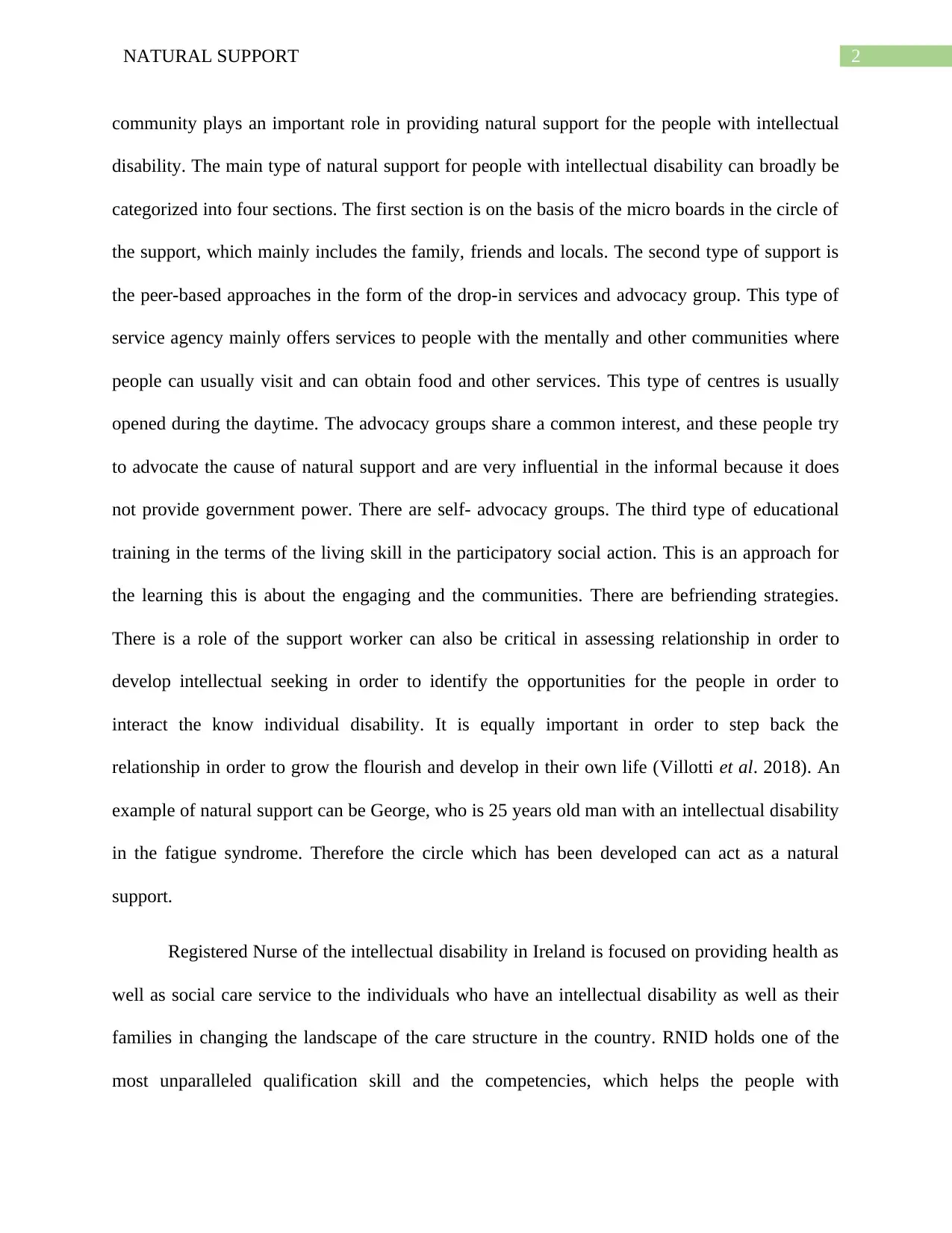
2NATURAL SUPPORT
community plays an important role in providing natural support for the people with intellectual
disability. The main type of natural support for people with intellectual disability can broadly be
categorized into four sections. The first section is on the basis of the micro boards in the circle of
the support, which mainly includes the family, friends and locals. The second type of support is
the peer-based approaches in the form of the drop-in services and advocacy group. This type of
service agency mainly offers services to people with the mentally and other communities where
people can usually visit and can obtain food and other services. This type of centres is usually
opened during the daytime. The advocacy groups share a common interest, and these people try
to advocate the cause of natural support and are very influential in the informal because it does
not provide government power. There are self- advocacy groups. The third type of educational
training in the terms of the living skill in the participatory social action. This is an approach for
the learning this is about the engaging and the communities. There are befriending strategies.
There is a role of the support worker can also be critical in assessing relationship in order to
develop intellectual seeking in order to identify the opportunities for the people in order to
interact the know individual disability. It is equally important in order to step back the
relationship in order to grow the flourish and develop in their own life (Villotti et al. 2018). An
example of natural support can be George, who is 25 years old man with an intellectual disability
in the fatigue syndrome. Therefore the circle which has been developed can act as a natural
support.
Registered Nurse of the intellectual disability in Ireland is focused on providing health as
well as social care service to the individuals who have an intellectual disability as well as their
families in changing the landscape of the care structure in the country. RNID holds one of the
most unparalleled qualification skill and the competencies, which helps the people with
community plays an important role in providing natural support for the people with intellectual
disability. The main type of natural support for people with intellectual disability can broadly be
categorized into four sections. The first section is on the basis of the micro boards in the circle of
the support, which mainly includes the family, friends and locals. The second type of support is
the peer-based approaches in the form of the drop-in services and advocacy group. This type of
service agency mainly offers services to people with the mentally and other communities where
people can usually visit and can obtain food and other services. This type of centres is usually
opened during the daytime. The advocacy groups share a common interest, and these people try
to advocate the cause of natural support and are very influential in the informal because it does
not provide government power. There are self- advocacy groups. The third type of educational
training in the terms of the living skill in the participatory social action. This is an approach for
the learning this is about the engaging and the communities. There are befriending strategies.
There is a role of the support worker can also be critical in assessing relationship in order to
develop intellectual seeking in order to identify the opportunities for the people in order to
interact the know individual disability. It is equally important in order to step back the
relationship in order to grow the flourish and develop in their own life (Villotti et al. 2018). An
example of natural support can be George, who is 25 years old man with an intellectual disability
in the fatigue syndrome. Therefore the circle which has been developed can act as a natural
support.
Registered Nurse of the intellectual disability in Ireland is focused on providing health as
well as social care service to the individuals who have an intellectual disability as well as their
families in changing the landscape of the care structure in the country. RNID holds one of the
most unparalleled qualification skill and the competencies, which helps the people with
⊘ This is a preview!⊘
Do you want full access?
Subscribe today to unlock all pages.

Trusted by 1+ million students worldwide
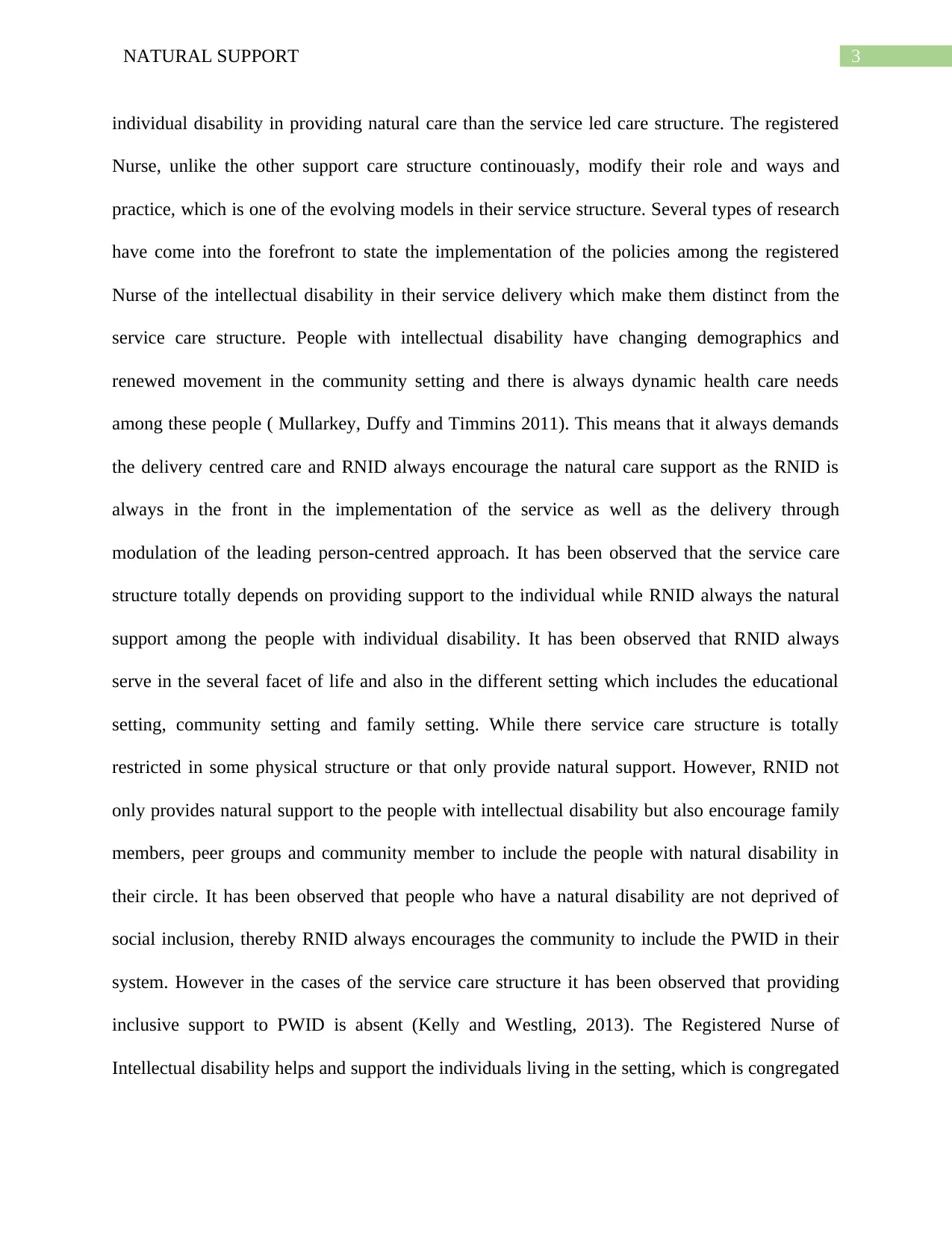
3NATURAL SUPPORT
individual disability in providing natural care than the service led care structure. The registered
Nurse, unlike the other support care structure continouasly, modify their role and ways and
practice, which is one of the evolving models in their service structure. Several types of research
have come into the forefront to state the implementation of the policies among the registered
Nurse of the intellectual disability in their service delivery which make them distinct from the
service care structure. People with intellectual disability have changing demographics and
renewed movement in the community setting and there is always dynamic health care needs
among these people ( Mullarkey, Duffy and Timmins 2011). This means that it always demands
the delivery centred care and RNID always encourage the natural care support as the RNID is
always in the front in the implementation of the service as well as the delivery through
modulation of the leading person-centred approach. It has been observed that the service care
structure totally depends on providing support to the individual while RNID always the natural
support among the people with individual disability. It has been observed that RNID always
serve in the several facet of life and also in the different setting which includes the educational
setting, community setting and family setting. While there service care structure is totally
restricted in some physical structure or that only provide natural support. However, RNID not
only provides natural support to the people with intellectual disability but also encourage family
members, peer groups and community member to include the people with natural disability in
their circle. It has been observed that people who have a natural disability are not deprived of
social inclusion, thereby RNID always encourages the community to include the PWID in their
system. However in the cases of the service care structure it has been observed that providing
inclusive support to PWID is absent (Kelly and Westling, 2013). The Registered Nurse of
Intellectual disability helps and support the individuals living in the setting, which is congregated
individual disability in providing natural care than the service led care structure. The registered
Nurse, unlike the other support care structure continouasly, modify their role and ways and
practice, which is one of the evolving models in their service structure. Several types of research
have come into the forefront to state the implementation of the policies among the registered
Nurse of the intellectual disability in their service delivery which make them distinct from the
service care structure. People with intellectual disability have changing demographics and
renewed movement in the community setting and there is always dynamic health care needs
among these people ( Mullarkey, Duffy and Timmins 2011). This means that it always demands
the delivery centred care and RNID always encourage the natural care support as the RNID is
always in the front in the implementation of the service as well as the delivery through
modulation of the leading person-centred approach. It has been observed that the service care
structure totally depends on providing support to the individual while RNID always the natural
support among the people with individual disability. It has been observed that RNID always
serve in the several facet of life and also in the different setting which includes the educational
setting, community setting and family setting. While there service care structure is totally
restricted in some physical structure or that only provide natural support. However, RNID not
only provides natural support to the people with intellectual disability but also encourage family
members, peer groups and community member to include the people with natural disability in
their circle. It has been observed that people who have a natural disability are not deprived of
social inclusion, thereby RNID always encourages the community to include the PWID in their
system. However in the cases of the service care structure it has been observed that providing
inclusive support to PWID is absent (Kelly and Westling, 2013). The Registered Nurse of
Intellectual disability helps and support the individuals living in the setting, which is congregated
Paraphrase This Document
Need a fresh take? Get an instant paraphrase of this document with our AI Paraphraser
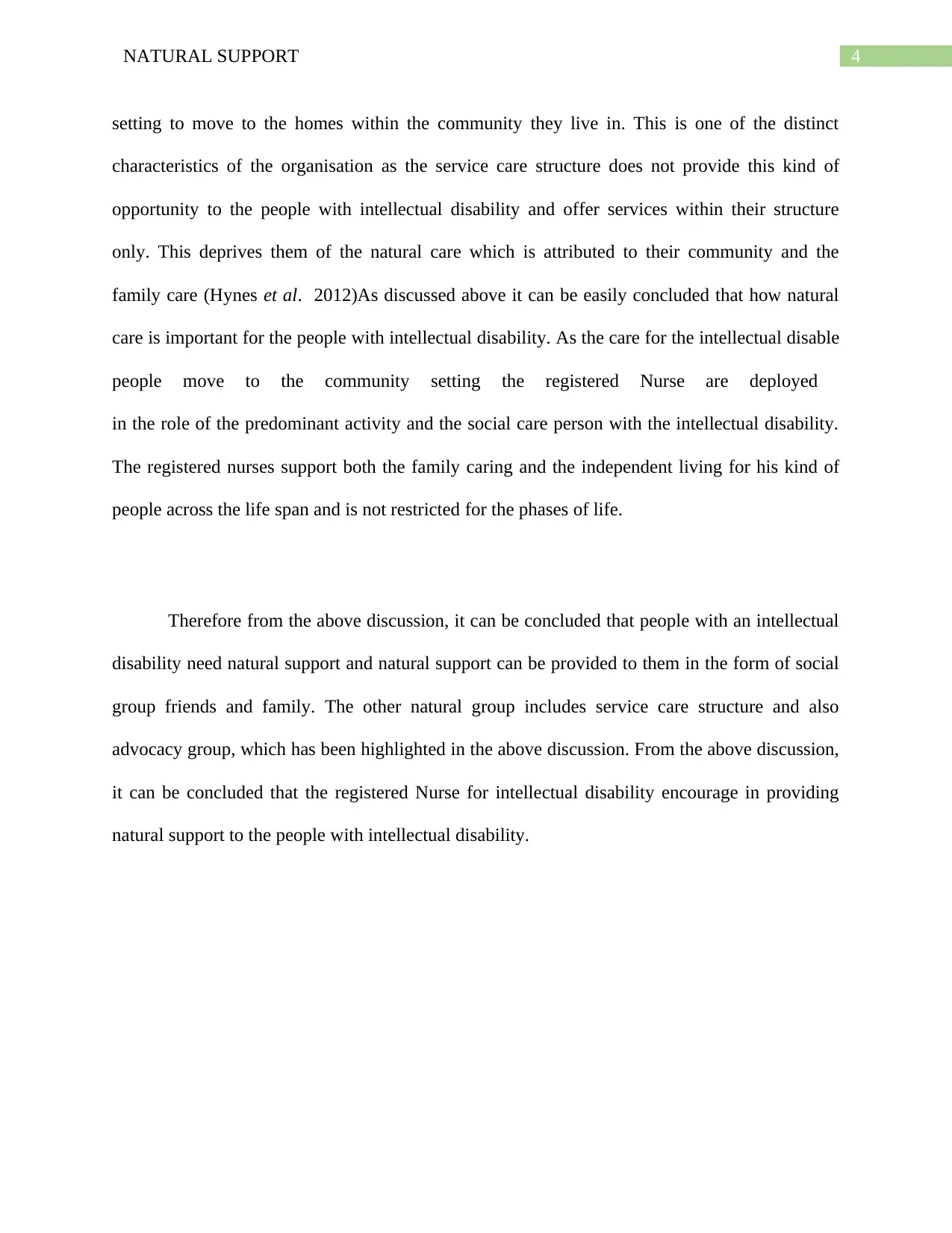
4NATURAL SUPPORT
setting to move to the homes within the community they live in. This is one of the distinct
characteristics of the organisation as the service care structure does not provide this kind of
opportunity to the people with intellectual disability and offer services within their structure
only. This deprives them of the natural care which is attributed to their community and the
family care (Hynes et al. 2012)As discussed above it can be easily concluded that how natural
care is important for the people with intellectual disability. As the care for the intellectual disable
people move to the community setting the registered Nurse are deployed
in the role of the predominant activity and the social care person with the intellectual disability.
The registered nurses support both the family caring and the independent living for his kind of
people across the life span and is not restricted for the phases of life.
Therefore from the above discussion, it can be concluded that people with an intellectual
disability need natural support and natural support can be provided to them in the form of social
group friends and family. The other natural group includes service care structure and also
advocacy group, which has been highlighted in the above discussion. From the above discussion,
it can be concluded that the registered Nurse for intellectual disability encourage in providing
natural support to the people with intellectual disability.
setting to move to the homes within the community they live in. This is one of the distinct
characteristics of the organisation as the service care structure does not provide this kind of
opportunity to the people with intellectual disability and offer services within their structure
only. This deprives them of the natural care which is attributed to their community and the
family care (Hynes et al. 2012)As discussed above it can be easily concluded that how natural
care is important for the people with intellectual disability. As the care for the intellectual disable
people move to the community setting the registered Nurse are deployed
in the role of the predominant activity and the social care person with the intellectual disability.
The registered nurses support both the family caring and the independent living for his kind of
people across the life span and is not restricted for the phases of life.
Therefore from the above discussion, it can be concluded that people with an intellectual
disability need natural support and natural support can be provided to them in the form of social
group friends and family. The other natural group includes service care structure and also
advocacy group, which has been highlighted in the above discussion. From the above discussion,
it can be concluded that the registered Nurse for intellectual disability encourage in providing
natural support to the people with intellectual disability.
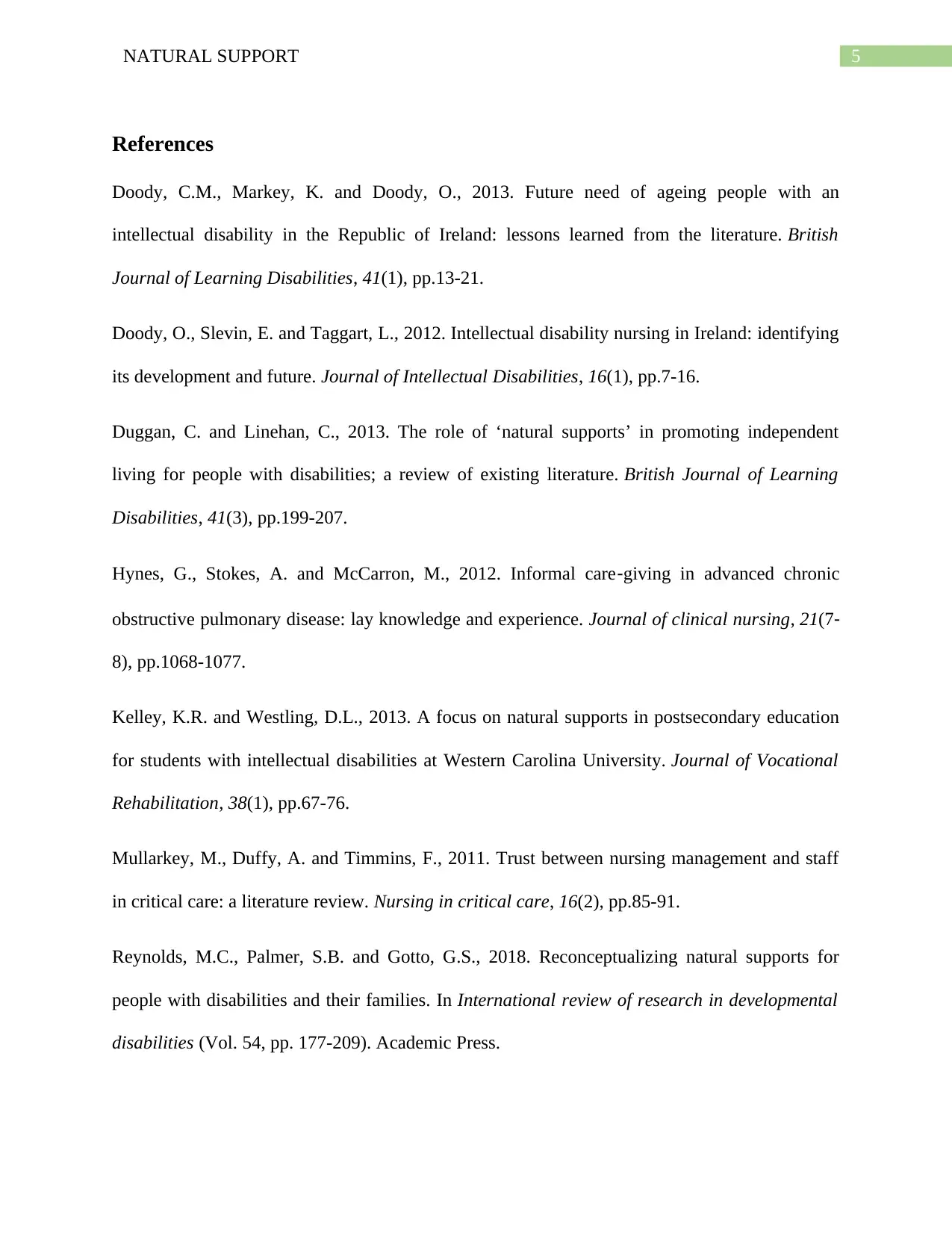
5NATURAL SUPPORT
References
Doody, C.M., Markey, K. and Doody, O., 2013. Future need of ageing people with an
intellectual disability in the Republic of Ireland: lessons learned from the literature. British
Journal of Learning Disabilities, 41(1), pp.13-21.
Doody, O., Slevin, E. and Taggart, L., 2012. Intellectual disability nursing in Ireland: identifying
its development and future. Journal of Intellectual Disabilities, 16(1), pp.7-16.
Duggan, C. and Linehan, C., 2013. The role of ‘natural supports’ in promoting independent
living for people with disabilities; a review of existing literature. British Journal of Learning
Disabilities, 41(3), pp.199-207.
Hynes, G., Stokes, A. and McCarron, M., 2012. Informal care‐giving in advanced chronic
obstructive pulmonary disease: lay knowledge and experience. Journal of clinical nursing, 21(7‐
8), pp.1068-1077.
Kelley, K.R. and Westling, D.L., 2013. A focus on natural supports in postsecondary education
for students with intellectual disabilities at Western Carolina University. Journal of Vocational
Rehabilitation, 38(1), pp.67-76.
Mullarkey, M., Duffy, A. and Timmins, F., 2011. Trust between nursing management and staff
in critical care: a literature review. Nursing in critical care, 16(2), pp.85-91.
Reynolds, M.C., Palmer, S.B. and Gotto, G.S., 2018. Reconceptualizing natural supports for
people with disabilities and their families. In International review of research in developmental
disabilities (Vol. 54, pp. 177-209). Academic Press.
References
Doody, C.M., Markey, K. and Doody, O., 2013. Future need of ageing people with an
intellectual disability in the Republic of Ireland: lessons learned from the literature. British
Journal of Learning Disabilities, 41(1), pp.13-21.
Doody, O., Slevin, E. and Taggart, L., 2012. Intellectual disability nursing in Ireland: identifying
its development and future. Journal of Intellectual Disabilities, 16(1), pp.7-16.
Duggan, C. and Linehan, C., 2013. The role of ‘natural supports’ in promoting independent
living for people with disabilities; a review of existing literature. British Journal of Learning
Disabilities, 41(3), pp.199-207.
Hynes, G., Stokes, A. and McCarron, M., 2012. Informal care‐giving in advanced chronic
obstructive pulmonary disease: lay knowledge and experience. Journal of clinical nursing, 21(7‐
8), pp.1068-1077.
Kelley, K.R. and Westling, D.L., 2013. A focus on natural supports in postsecondary education
for students with intellectual disabilities at Western Carolina University. Journal of Vocational
Rehabilitation, 38(1), pp.67-76.
Mullarkey, M., Duffy, A. and Timmins, F., 2011. Trust between nursing management and staff
in critical care: a literature review. Nursing in critical care, 16(2), pp.85-91.
Reynolds, M.C., Palmer, S.B. and Gotto, G.S., 2018. Reconceptualizing natural supports for
people with disabilities and their families. In International review of research in developmental
disabilities (Vol. 54, pp. 177-209). Academic Press.
⊘ This is a preview!⊘
Do you want full access?
Subscribe today to unlock all pages.

Trusted by 1+ million students worldwide
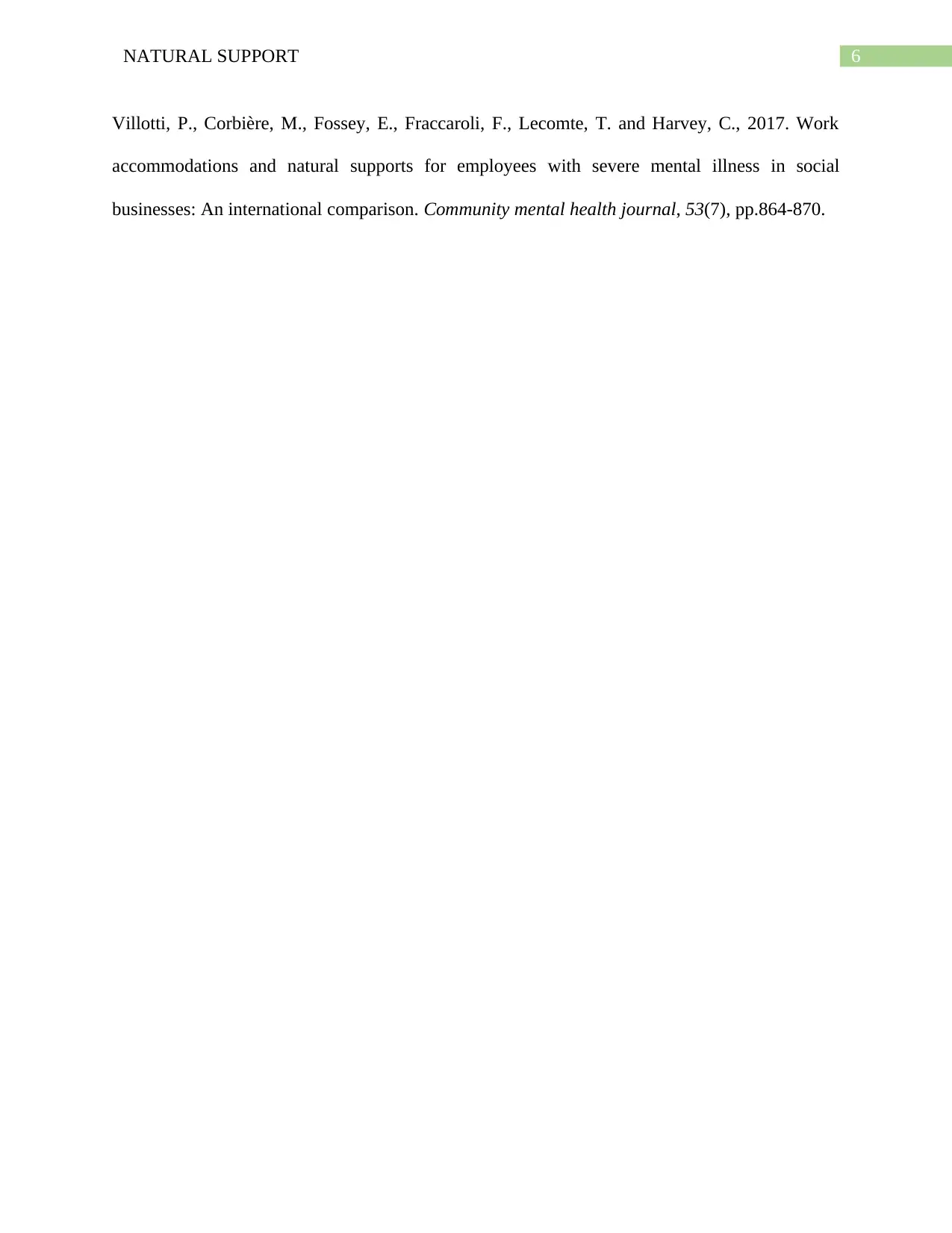
6NATURAL SUPPORT
Villotti, P., Corbière, M., Fossey, E., Fraccaroli, F., Lecomte, T. and Harvey, C., 2017. Work
accommodations and natural supports for employees with severe mental illness in social
businesses: An international comparison. Community mental health journal, 53(7), pp.864-870.
Villotti, P., Corbière, M., Fossey, E., Fraccaroli, F., Lecomte, T. and Harvey, C., 2017. Work
accommodations and natural supports for employees with severe mental illness in social
businesses: An international comparison. Community mental health journal, 53(7), pp.864-870.
1 out of 7
Related Documents
Your All-in-One AI-Powered Toolkit for Academic Success.
+13062052269
info@desklib.com
Available 24*7 on WhatsApp / Email
![[object Object]](/_next/static/media/star-bottom.7253800d.svg)
Unlock your academic potential
Copyright © 2020–2026 A2Z Services. All Rights Reserved. Developed and managed by ZUCOL.





